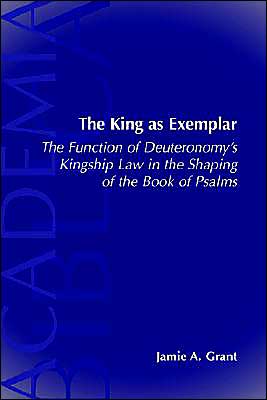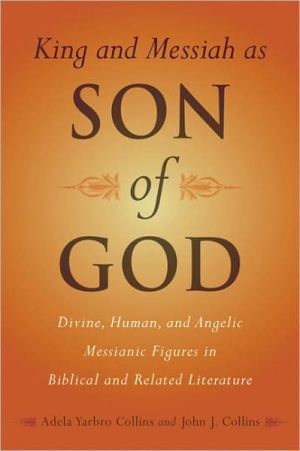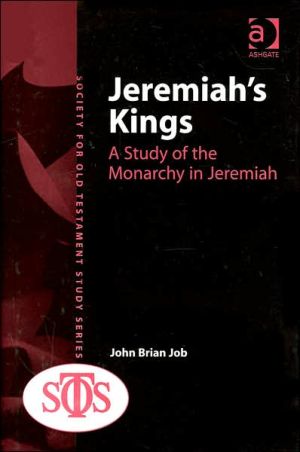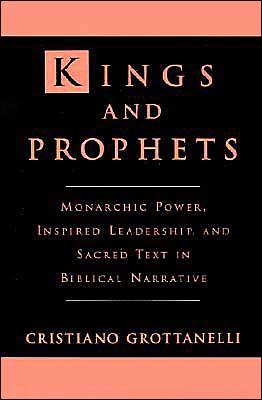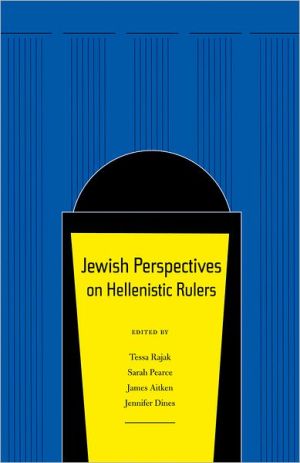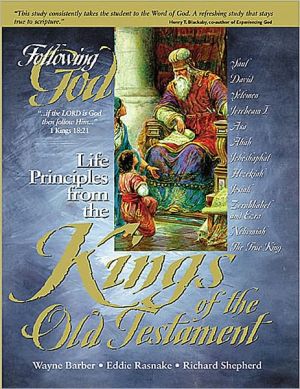King as Exemplar: The Function of Deuteronomy's Kingship Law in the Shaping of the Book of Psalms
The rationale of the order of Psalms is a puzzle at least as old as Augustine in the fourth century, and Grant (Biblical studies, Highland Theological College, Scotland) does not aspire to solve the whole thing here and now. Rather he bites off only one aspect, a particular paradigm that may have influenced the shape of the Psalms in certain ways. He argues that the Deuteronomic Kingship Law, in Deuteronomy 17:14-20, has been used as an intellectual construct to shape and nuance the psalmic...
Search in google:
AcknowledgementsxiiiAbbreviationsxvIntroduction1Chapter 1Methodological Considerations71Introduction71.1Outline of the Central Argument102Canonical Approach112.1Canonical Method in the Study of the Psalms132.2Identifying Editorial Agendas142.3The Question of Significant Placement162.4Cautionary Notes regarding Methodology173Choice of Psalms203.1Editorial Significance of Torah Psalms203.2Editorial Significance of Kingship Psalms254Comparative Method274.1Biblical Conversation284.2Which Deuteronomy?305Eschatological Rereading of the Psalms33Chapter 2Torah-Kingship Theme in Psalms 1-2411Introduction412Analysis of Psalm 1432.1Deuteronomic Background to Psalm 1432.1.1Psalm 1 and the Shema432.1.2Centrality of Torah452.1.3Dependence on Yahweh492.1.4Eschatological Rereading of Psalm 1502.1.5Theology of the Two Ways522.2Assessment of the Theological Significance of Psalm 1533Analysis of Psalm 2563.1Deuteronomic Background to Psalm 2573.1.1The King's Dependence upon Yahweh583.1.2Psalm 2's Association with Psalm 1604Theological Significance of a Dtr Introduction to the Psalter654.1Deuteronomic Worldview654.2Kingship Law and the Psalms665Conclusion69Chapter 3Torah-Kingship Theme in Psalms 18-21711Introduction712Choice of Psalms 18-21723Analysis of Psalm 18743.1Deuteronomic Background to Psalm 18783.1.1Appellatives783.1.2Theophany803.1.3Torah Centre and Declaration of Blamelessness813.1.4Theology of the Two Ways843.1.5Appellatives Again853.2Association of Psalm 18 and Psalms 1 and 2863.2.1Yahweh as Refuge863.2.2Torah and Delight873.2.3Theology of the Two Ways883.2.4Universal Dominion883.2.5Yahweh's Messiah883.3Conclusion regarding Psalm 18894Analysis of Psalm 19894.1Structure of Psalm 19904.2Deuteronomic Background to Psalm 19914.2.1Polemic924.2.2Torah Theology934.2.3Prayer of Psalm 19 and Personal Piety954.2.4Psalm 19 and Deuteronomy 4964.3Link between Psalm 18 and Psalm 19974.3.1Superscriptions974.3.2Appellatives974.3.3Characteristics of Yahweh and His Torah984.3.4Servant of the Lord984.4Association of Psalm 19 with Psalms 1 and 2994.4.1Expansion of Torah Theme994.4.2Psalm 19 as Example of Delight in Yahweh's Torah1004.4.3Conceptual Associations1004.4.4Kingship Theme1014.5Conclusion regarding Psalm 191015Analysis of Psalms 20 and 211025.1Association of Psalms 20 and 211045.2Deuteronomic Content of Psalms 20 and 211055.2.1Name-Theology1055.2.2Dependence upon Yahweh1075.2.3Trust in Yahweh vs. Dependence in Military Power1085.2.4Salvation/Victory Belonging to Yahweh1095.2.5Covenant Theme in Psalm 211105.3Association with Psalms 18 and 191125.4Association with Psalms 1 and 21125.4.1Kingship-Torah Theme1135.4.2Messiah Link1145.4.3Prayer Theme1145.4.4Theme of the Two Ways1156Conclusion1166.1Background in Deuteronomic Theology1166.2Torah-Kingship Connection1166.3Democratisation of the King1176.4Limitation of the Power of the King1186.5Torah-Prayer Link118Chapter 4Torah-Kingship Theme in Psalms 118-1191211Introduction1212Selection of Psalms 118 and 1191223Analysis of Psalm 1181253.1Deuteronomic Influences in Psalm 1181273.1.1Ps 118 as Entrance Liturgy1273.1.2Eternal Hesed of Yahweh1293.1.3Fearers of Yahweh1303.1.4Trust in Yahweh1333.1.5Yahweh as the Psalmist's Help1353.1.6Trust in Yahweh-Not in Men/Princes1353.1.7Surrounding Nations, Circumcision, Name Theology1373.1.8Yahweh as Help and Salvation1393.1.9This Day, Prosperity, Name Theology1403.1.10Individual and Community1424Psalm 118 in the Light of Psalms 1-2 and 18-211434.1Salvation of the Lord's Anointed1434.2Dependence upon Yahweh1444.3Yahweh as Refuge1454.4Theology of the Two Ways1464.5Prayer Theme1464.6Torah-Piety1474.7Conclusion regarding Psalm 1181485Analysis of Psalm 1191485.1Deuteronomic Influences on Psalm 1191575.1.1Torah Synonyms1575.1.2Language of Devotion1595.1.3Dependence upon Yahweh and the Name of Yahweh1615.1.4Yahweh as Refuge and Torah1635.1.5Theology of the Two Ways1645.1.6Meditation and Prosperity1665.1.7Continuous Torah Meditation1685.1.8Grace Enabling Obedience1695.1.9The "I" of Psalm 119 as the Dtr King1716Links between Psalms 118 and 1191756.1Canonical1756.2Lexical1766.3Theological1807Psalm 119 in the Light of Psalm Groupings 1-2 and 18-211807.1Torah-Piety1817.2Meditation1827.3Blessedness and Prosperity1837.4The Two Ways1847.5Prayer1857.6Dependence upon Yahweh and the Kingship Law1867.7Name Theology1867.8Blamelessness of the King1877.9Conclusion1878Conclusion regarding Torah-Kingship Psalm Groupings188Chapter 5The Kingship Law as a Paradigm1891Introduction1892Analysis of the Law of the King (Deut 17:14-20)1913Kingship Law as Inherently Anti-Monarchic?1943.1Introduction to the Kingship Law1943.2Kingship and Yahweh's Choice1964Characteristics of the King1984.1Essential Equality: Democratisation1994.2Restrictions on the Power of the King2014.2.1Absolute Dependence upon Yahweh2024.2.2Democratising Effect2054.3Torah-Piety of the King2064.4Essential Equality2104.5Conclusion regarding the Characteristics of the King2125The Kingship Law as a Paradigm in the Psalter2135.1King as Chosen by Yahweh2145.1.1Chosenness in Psalms 1-22155.1.2Chosenness in Psalms 18-212155.1.3Chosenness in Psalms 118-1192165.2King's Dependence upon Yahweh2165.2.1Dependence Theme in Psalms 1-22175.2.2Dependence Theme in Psalms 18-212175.2.3Dependence Theme in Psalms 118-1192185.3King as Exemplar of Torah-Piety2185.3.1Torah-Piety Theme in Psalms 1-22195.3.2Torah-Piety Theme in Psalms 18-212195.3.3Torah-Piety Theme in Psalms 118-1192195.4Humility of the King2206Conclusion221Chapter 6The Editorial Placement of the Torah-Kingship Psalm Groupings2231Introduction2232Assessing Psalm Groupings: Conjunctive and Disjunctive Features2243Psalms 1-2: Book I, the Davidic Psalter(s) and the Psalter2273.1Disjunctive: Lack of Superscription2273.2Conjunctive: Davidic King in Psalms 1-22293.3Conjunctive: Psalms 1-2 cf. Psalm 412303.4Conclusion regarding the Placement of Psalms 1-22304Psalms 18-21 within Book I of Psalter2344.1Psalms 18-21: Central to Book I2395Psalms 118-119: Central to Book V2406Bracketing Function of Torah-Kingship Groupings2447Excursus: A Brief Word about History2468Conclusion250Chapter 7Torah, Kingship and Democratisation2531Introduction2532Torah2552.1Torah in the Psalms2562.1.1Reading Torah in the Torah Psalms2592.1.2Torah in the Psalms and the Pentateuch2612.2Torah in Deuteronomy2652.2.1"This Torah" in the Kingship Law2662.2.2Sonnet on "This Torah" in Kingship Law2672.3Torah and Relationship with Yahweh2702.4Conclusion regarding Torah2712.5Excursus: Translation of Torah2713Kingship2733.1Kingship in Torah-Kingship Psalm Groupings2743.1.1Conclusion regarding Kingship in the Torah-Kingship Psalm Groupings2773.2Kingship in the Kingship Law2783.3Conclusion regarding Kingship2804Democratisation2804.1Democratisation of Torah and Kingship Psalms2814.1.1Reinterpretation of Royal Psalms2824.1.2Democratisation of the Torah-Kingship Psalm Groupings2844.2Democratisation in the Kingship Law2864.2.1The King as One of the Hebrew Brothers2864.2.2Democratisation in Deuteronomy2874.3Conclusion regarding Democratisation2885Conclusion289Conclusion291Final Words294Bibliography297Author Index313Scripture Index319General Index327
